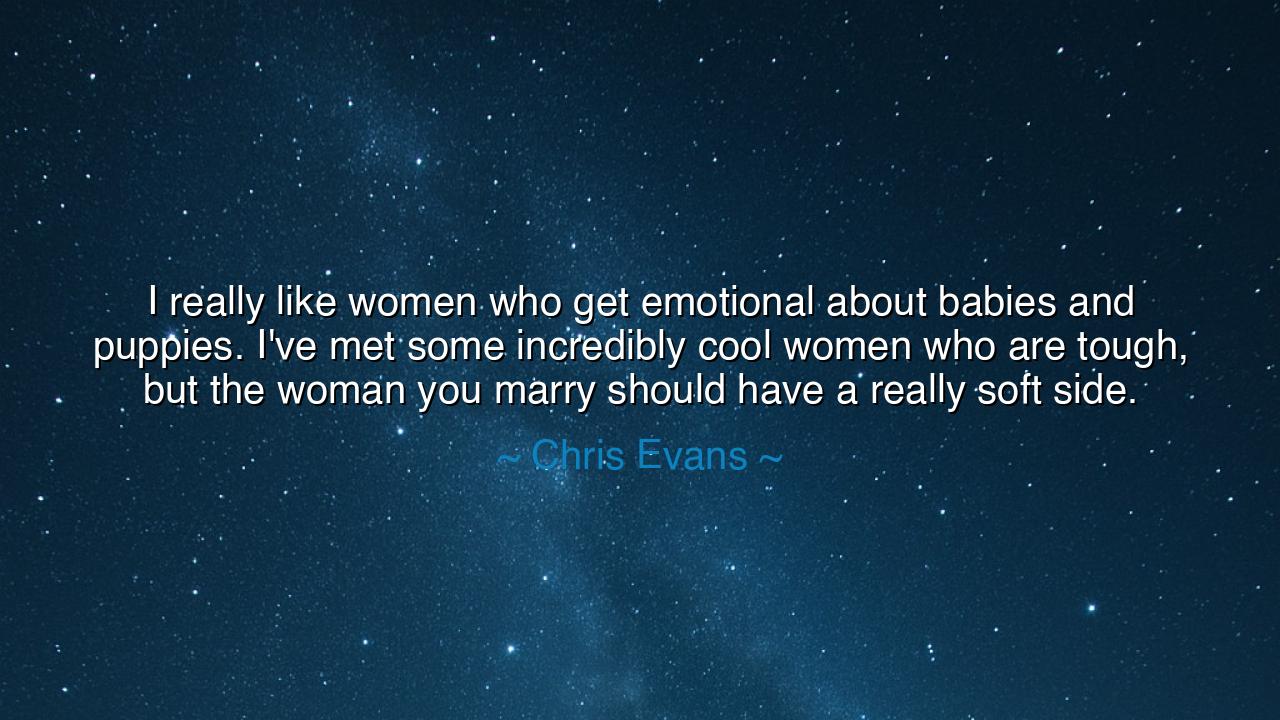
I really like women who get emotional about babies and puppies.
I really like women who get emotional about babies and puppies. I've met some incredibly cool women who are tough, but the woman you marry should have a really soft side.






"I really like women who get emotional about babies and puppies. I've met some incredibly cool women who are tough, but the woman you marry should have a really soft side." – Chris Evans.
In these words, Chris Evans reveals his deep admiration for the balance between strength and vulnerability in women, particularly in the context of romantic relationships. His statement reflects a belief in the importance of softness and emotional depth as essential qualities for a partner. While strength and resilience are valued traits, Evans emphasizes that true connection in a relationship is fostered not just through toughness, but through the ability to show compassion, to be moved by innocence, and to display a gentle heart. The image of a woman getting emotional over babies and puppies captures an inherent nurturing instinct, a side that is often overshadowed in a world that praises power and stoicism.
This concept of balance between strength and vulnerability has been explored by philosophers since ancient times. The Greeks, for example, celebrated the Aristotelian ideal of the golden mean, which teaches that virtue lies in moderation, avoiding the extremes of excess or deficiency. Aristotle understood that true character is found in the ability to maintain a balanced soul, where courage, emotional depth, and reason coexist. In the same way, Evans’ quote reflects the ancient wisdom that the strongest individuals are those who do not repress their emotions but allow them to flow freely, tempered by the wisdom of experience and the maturity of their hearts.
Consider the story of Antigone, the tragic heroine from Sophocles' play, who displayed incredible strength in defying the king’s orders to protect her brother's burial rites. She was a woman of great resolve, yet her softness came through in her profound sense of duty and love for her family. Her defiance was not born of bitterness or hardness but from a deep emotional connection to her kin and the values of what was right. Antigone’s strength, however formidable, was rooted in a softness of heart—a love so pure and unconditional that it transcended the laws of men. Her story is a reminder that greatness in a person is often measured not just by their physical or external toughness but by the softness of their internal moral compass, guiding their actions with love, empathy, and compassion.
The Renaissance also offers us examples of balance in great figures, such as Leonardo da Vinci, who embodied both intellectual rigor and profound sensitivity to the beauty and fragility of life. Leonardo, while a visionary and scientist, was deeply moved by the natural world, seeing in it not just the mechanics of anatomy but the grace and vulnerability of living beings. He was fascinated by the intricate beauty of babies and animals, often sketching them with a tenderness that reflects a man who understood the delicate balance between mind and heart, between reason and emotion. In his studies and art, Leonardo showed that strength of character does not lie only in intellectual or physical might but in the ability to embrace the full range of human emotion and sensitivity.
In more recent history, Marie Curie, the pioneering physicist, exhibited both toughness and gentleness in her groundbreaking work with radioactivity. Curie was unwavering in her dedication to science, yet she was also a mother who deeply cared for her children, demonstrating a softness of heart that resonated through her personal and professional life. Her remarkable achievements were not just a result of her intellectual rigor but also her emotional resilience, the ability to balance the pressures of being a scientist with the tenderness required in motherhood. Curie’s strength was not cold or detached but deeply rooted in compassion, much like the ideal Evans describes: a woman who is tough yet emotionally soft.
The lesson in Evans’ statement lies in the value of embracing both strength and vulnerability in relationships. While toughness and resilience are essential, the capacity for compassion, empathy, and gentleness creates the foundation for deeper emotional connection. In our own lives, we must seek to embody this balance. We are all called to be strong in the face of adversity, but we must not lose our softness, our ability to empathize, love, and care. Whether in relationships, work, or personal growth, it is the balance between these qualities that allows us to become the best versions of ourselves— resilient yet tender, strong yet compassionate.
In our own personal relationships, it is important to appreciate the softness of others, as well as our own. True connection comes from being open to both the strength and vulnerability that exist within us all. Just as Chris Evans admires the balance of toughness and tenderness in a partner, we too can cultivate relationships that honor both the strength of character and the gentleness of heart. Let us strive to be both resilient and compassionate, and in doing so, we will build deeper connections that honor the fullness of the human experience. Just as the ancients recognized, true greatness is not found in the extremes but in the delicate balance between strength and vulnerability, between head and heart.






AAdministratorAdministrator
Welcome, honored guests. Please leave a comment, we will respond soon